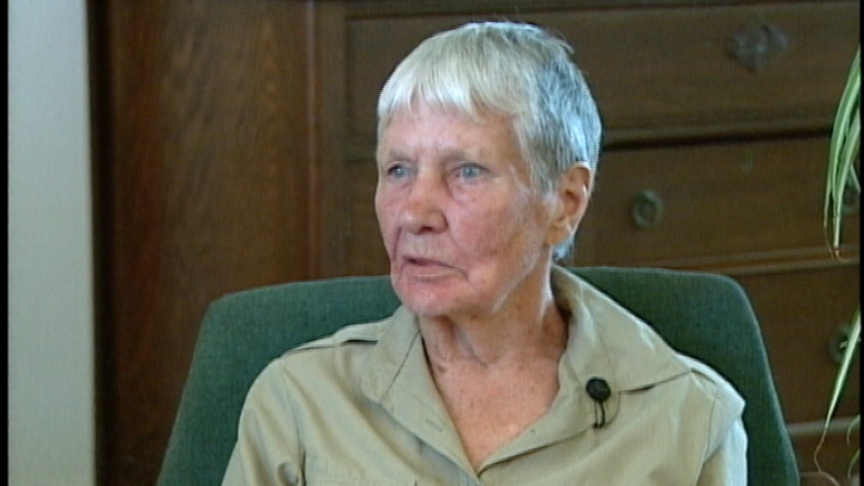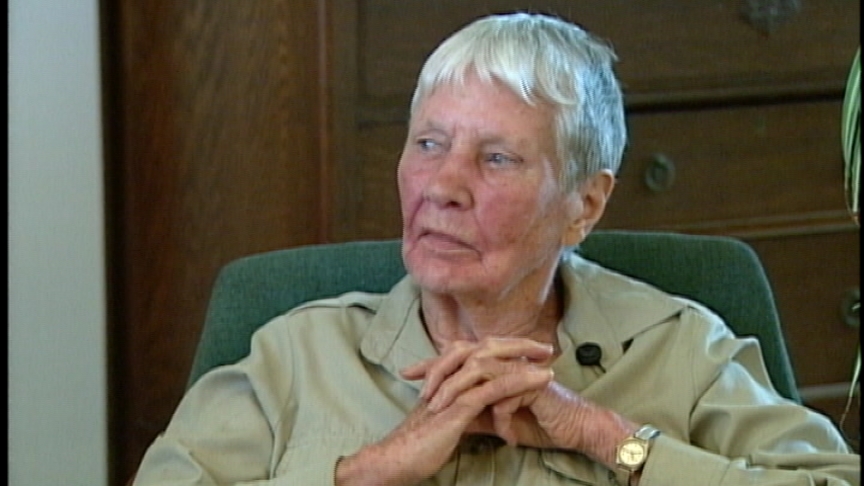Stationed in France
Heroes Remember
Stationed in France
Transcript
I was, went to Rouen, and it was in Rouen at number 8 hospital
that I, because I had just come, and a head injury had just come
and the head injury wanted, head injury unit wanted a nurse to
be in charge of their ward, so I was attached to them, and I
found out what it was like to be, um, not one of the inner
circle, because once, it was only a little unit, there were only
two other, two operating room nurses and three surgeons and
their nurses, that's about all there was to the unit. And then
I was attached, I would never, I wasn't really part of it, I was
just attached. So anyway then we, and we moved, the head injury
moved to whatever hospital was closest to the front. So we were
in Rouen, and that's when I had the worst experience at the ward,
I think. In that the head injuries were with us, were with the
plastic unit and of course the plastic unit were a lot of people
who had been shot in the face and what not, and that was the
worst, because you saw this awful mutilated face, and the person
was still conscious. And that was really, very very difficult.
The unit that moved in after us took to the basement, they
didn't, they didn't use the upper part at all, and we were
billeted in peoples houses, and I can remember seeing, you know
a plate glass storm window and a buzz bomb came and I could see
that ripple. I shouldn't have been there cause if it ever
broken, poor me. And there was a direct hit on the theatre and
everybody inside that theatre was killed. And we had ten
casualties from head injuries and all ten eventually died. The
head injuries we had at that time we had one floor downstairs
and one floor up, and the floor downstairs there were thirty
beds and everybody was unconscious. The ones upstairs were
better, they didn't get very much care. And the ones downstairs
they were all unconscious, which meant they were incontinent, so
we nursed them with no clothes on and on blankets because the
blankets would absorb the urine and better than their sheet and
they wouldn't get bedsores so much. And we had to turn them
every couple of hours and everything. That was one time I had a
bad experience in that. As I was turning this man and they came
in, in such batches sometimes and this one doctor in particular
he'd want to examine everybody carefully, before, before he'd
leave them, the others learned to assess them and not take so
much time with one. Anyway, I turned this man and I heard his
neck creek and he died. He died because he'd had a broken neck
which wasn't displaced, but when I turned him it displaced it
and he died. I had another funny, oh bad experience too, where
I had three patients by the name of Ward, and one was very badly
hit, hurt, the other was unconscious, but not badly, not as
badly hurt and one was upstairs. Well I got them mixed up and I
sent the wrong one back to England. I sent the one that was
badly hurt, he was going to die anyway, back to England, and the
one that should have been sent back I kept
and the one upstairs dropped over dead, so that was that.
Then we moved from there to Turnout, we spent Christmas at
Turnout and then we moved on up. You see, I was getting pretty
tired, to tell the truth, cause I hadn't had any leave, really,
throughout the last, ya know, since, well I had to have a weeks
leave in Italy and that's all the leave I've had in the last
three years. So I was getting pretty tired, and. So eventually
my health sort of gave out and they sent me back to England to
the convalescent home and I was there when the war ended.
Interviewer: Can you tell me how you felt emotionally, I can see
you now as an older women, but being such a young girl and going
to England and starting to meet the casualties and seeing the
casualties, especially when they came in from Dieppe. How do
you think that you managed to handle that at such a young age?
Ya know, if you are doing something about things, and are busy
and are not just observing, you don't have time to be very
emotional about it. It is, an operating room work is not half
as emotionally draining, I think as, because you don't know the
patient, you don't see, only see a little bit of the
patient, so it isn't just quite the same as on the wards.
Description
After D-Day, Ms. Rogers was sent to France where she was attached to a head injury unit.
Ruby Rogers
Ruby Rogers was born in 1917 in Cherrywood, Ontario. At a young age, she moved to Agincourt. When she was 19 years old, she went into training to be a nurse at Toronto General Hospital. Shortly after the Second World War began, she enlisted with the Canadian Army and was sent to England.
Meta Data
- Medium:
- Video
- Owner:
- Veterans Affairs Canada
- Duration:
- 07:10
- Person Interviewed:
- Ruby Rogers
- War, Conflict or Mission:
- Second World War
- Branch:
- Army
- Occupation:
- Nurse
Related Videos
- Date modified:




